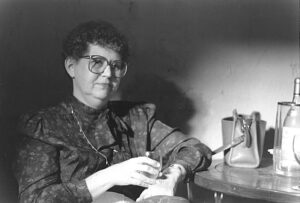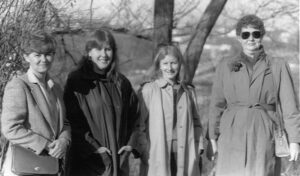Annie Janeiro Randall, Professor of Music at Bucknell University, is the author of Dusty! Queen of the Postmods and editor of Music, Power, and Politics. We invited her to share her remembrance of Prof. Karin Pendle, and are happy to offer her thoughts, below. We mentioned Prof. Pendle’s passing a few weeks ago and linked to Dr. Janelle Gelfand’s appreciation. Dr. Randall also recommends Jenelle Gelfand’s post, as the two perspectives complement each other.
What comes to mind, first and always, when I remember Dr. Karin Pendle is a sense of infinite gratitude for the scholarly and professional guidance I received from her. Like many of her other dissertation advisees, I benefited from her endless edits, requests for revisions, and the occasional, quietly devastating observation that a piece of work was “not quite ready.” Beyond this professional, intellectual generosity, Dr. Pendle gave us her crucial personal support to draw bold conclusions and challenge longstanding assumptions and methods.

Dr. Karin Pendle
I recall a conversation with “KP” in which she asked me why a particular passage of my dissertation draft seemed so wishy-washy. I admitted to being afraid of directly contradicting the work of established scholars. I had, as a result, practically erased my own opinions. She replied, “Oh, ‘little old me,’ is that it? Little Old Me can’t say anything?” She continued firmly, “If you can support it, you must say it.” Such moments of support, while perhaps usual in adviser-advisee contexts, were extraordinarily powerful and empowering in the early days of feminist musicology, mid-1980s, right around the time of Bowers and Tick; Citron and McClary’s first publications, indeed, the “discovery” of women composers in the western European art tradition. Karin Pendle had been on the front lines of this generational, gendered struggle in academia and passed on to us the lessons she learned in battle, chief among them: Don’t silence yourself or allow yourself to be silenced.

Dr. Karin Pendle (r) and students (l-to-r) Jennifer Thomas, Jo Baim, Janelle Gelfand
Perhaps as a result of her frequent skirmishes with the patriarchs, KP had a militaristic air about her: mistake one of her directives, submit subpar work, or show up late for a meeting at your own peril! She conveyed the sense that we (the troops, her teaching assistants and advisees) needed to toughen up, stop whining, and meet her high standards if we were to survive on the musicological battlefield.
“Stoic” and “unsentimental” are words that also come to mind when remembering Karin Pendle, though I’m not sure they accurately describe her; they may have been strategies she adopted for self-preservation in male-defined workplaces. For most of her decades-long career she was the only woman musicologist in the division of Musicology, Theory, and Composition—a position not unlike the beleaguered queens in any number of her beloved operas—and she needed ways to navigate the minefields. Thank goodness for her heroic-tenor husband, Frank, whose love sustained Karin through all of it.
Finally, in remembering Karin Pendle, I’d like to memorialize the flashes of Feminist Rage that I and her other assistants witnessed on rare occasions. KP had a sharp wit that, in just a few words, could dismantle hypocrisy or expose appalling injustice. I wish more people had experienced her deadpan humor—jaw-dropping, under-the-breath lines worthy of Mae West. After delivering the verbal missile precisely to its target, she would get back on track, back to work, and advise us to do the same. Rest in peace, KP, and thank you for speaking up, pushing back, and claiming the spaces that we now pay forward with our own students.
